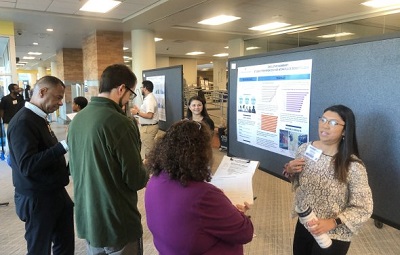Are Middle-Aged Caucasian Males Less Likely to Wear a Mask?
Description/Abstract/Artist Statement
The coronavirus disease 2019 (COVID-19) has been a serious threat to human health and has impacted individuals in various countries. The United States issued a mandate that enforced wearing facial masks to reduce the spread of the disease. Studies have shown that gender and political beliefs are associated with mask-wearing behaviors. This study investigated the likelihood of middle-aged Caucasian men wearing a face mask due to their personal and political views in comparison to women and other races. This observational study included a total number of 161 participants with 75 adult women and 86 adult men with an age range of 18 - 50+. It was hypothesized that men and younger adults were less likely to wear face masks in public environments than women and older adults. Descriptive statistics and frequency distributions were used to determine the analytical data of variables collected. Mask wearing behaviors were determined by both gender and age and had been analyzed using SPSS, independent t-tests, as well as an Analysis of Variance (ANOVA). Based on the one-way ANOVA, interaction between age and gender on mask wearing behaviors was found to be insignificant. Individuals above the age of 50 were more likely to wear their mask for a longer duration compared to other age groups observed. However, a significant correlation had been exhibited as men were more likely to wear their mask incorrectly compared to women.
Faculty Advisor/Mentor
Sheriyse Williams
Faculty Advisor/Mentor Department
Psychology Department
College Affiliation
College of Sciences
Presentation Type
Poster
Disciplines
Experimental Analysis of Behavior | Quantitative Psychology
Session Title
Poster Session
Location
Learning Commons Lobby @ Perry Library
Start Date
3-25-2023 8:30 AM
End Date
3-25-2023 10:00 AM
Are Middle-Aged Caucasian Males Less Likely to Wear a Mask?
Learning Commons Lobby @ Perry Library
The coronavirus disease 2019 (COVID-19) has been a serious threat to human health and has impacted individuals in various countries. The United States issued a mandate that enforced wearing facial masks to reduce the spread of the disease. Studies have shown that gender and political beliefs are associated with mask-wearing behaviors. This study investigated the likelihood of middle-aged Caucasian men wearing a face mask due to their personal and political views in comparison to women and other races. This observational study included a total number of 161 participants with 75 adult women and 86 adult men with an age range of 18 - 50+. It was hypothesized that men and younger adults were less likely to wear face masks in public environments than women and older adults. Descriptive statistics and frequency distributions were used to determine the analytical data of variables collected. Mask wearing behaviors were determined by both gender and age and had been analyzed using SPSS, independent t-tests, as well as an Analysis of Variance (ANOVA). Based on the one-way ANOVA, interaction between age and gender on mask wearing behaviors was found to be insignificant. Individuals above the age of 50 were more likely to wear their mask for a longer duration compared to other age groups observed. However, a significant correlation had been exhibited as men were more likely to wear their mask incorrectly compared to women.


